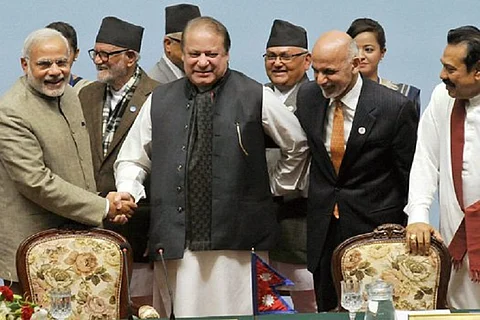

Timing and settings are necessary but not sufficient conditions in diplomacy for signals to be received and action to follow. Besides, the two rarely synchronise on a national and international level. A close calibration, however, is happening. By deciding to boycott the SAARC summit in Pakistan next November, New Delhi has secured both. Terrorism is on everyone’s mind in the world and Uri has shaken Indians to the core. The brutality of the killings - burning sleeping soldiers alive - will be remembered for long. Bangladesh, Afghanistan - both victims of terrorism - and Bhutan have now followed India out of the Islamabad summit. They have been invited by India along with Nepal, Sri Lanka, Myanmar and Thailand to join the BRICS summit in Goa in October. In other words, Pakistan, the eighth member of the regional grouping has been pointedly left out for one and only one reason.
New Delhi’s move unequivocally profiles the simple fact that there can be no parallel universe in the region – a region where one country exports terrorism and is backed in equal and different measure by Washington and Beijing. For the sake of comparison, imagine if one European country were to terrorise others in the European Union (EU) or if one state in the United States (US) was sending terrorists from New York to California to blow up people and places. Framed accurately, thus, some 1.3 billion people from Afghanistan, Bangladesh, Bhutan and India are telling the world that they will not sup with Pakistan. They are also telling the world that those who decide to do so will reap as they sow.
All this is new, as is the frenetic pace of activity in the South Asian region led by India. If it has pulled the rug from beneath the feet of moribund think-tanks and their satellites, it has also kicked out worshippers of status quo with Pakistan who have achieved nothing other than attending stifling conferences and endless seminars. From all indications the power of New Delhi’s ‘government college Lahore’ school of thought on Pakistan (shorthand for people to people contact, candle light marches, soldiers will die but talks must continue language, we are a greater power so we should be benevolent etc.) is on the wane. When you lose language, you also lose leverage.
A few experts I spoke to ahead of the UN Human Rights Council (UNHRC) session in Geneva earlier this month said New Delhi would never raise the issue of Baluchistan at the world body and Prime Minister Narendra Modi's Independence Day reference was a one-off thing. Maybe. In any case, there was no question of talking about Baluchistan at the UNGA is New York was the drift I gathered. What never got factored into these conclusions was the ceaseless terror Pakistan inflicts on India - in other words, cross border terror was a given! These conversations showed me that there are/were too many people in Delhi who claim to have an inside track or a ‘straight line’ to the Prime Minister. This happens with all people in power and interestingly enough, the satellites are also similar – inward looking, ill-informed and woefully lacking in new thinking and perspectives. Rarely do they have their ear to the ground.
South Asian Association for Regional Cooperation (SAARC),summits cannot be held even if one of its nine members desists. For all practical purposes, India’s move may be the end of SAARC, but there is no need to rejoice. Geopolitics is not about joy and sorrow – it is about interests and the deftness and alacrity with which countries protect their people and their interests constantly and consistently, day and night. While SAARC members are all bound economically and militarily to different powers (Sri Lanka, for example, is closely tied to China), what binds them closely to one another is not terrorism. By delineating what does not bind neighbours, India is charting a different course and telling the world it has had enough of false bonhomie and toxic talks.
The Uri attack which killed 17 Indian soldiers was the last straw that broke the camel’s back. When Narendra Modi said water and blood cannot flow together or when Foreign Minister Sushma Swaraj told the United Nations (UN) India had questions about who backed and funded terrorists, the question was posed well beyond India’s borders. Call it serendipity, luck or a combination of hard work and quick- thinking, India now has a fairly firm grip on global conversations (public and private) on terrorism. Countries that close their borders to different looking people or migrants and refugees will find themselves in bind if they lecture others about maintaining peace and stability in the South Asian region – that mother of all hypocrisies which empowers governments to foist dictatorships and terrorists on the world. Pakistan has two major powers China and the United States firmly behind, but what does it have as a face internationally? Never mind.
India withdrawing from the SAARC summit will not solve the issues between Indian and Pakistan but anyone who says they know the answer is either being facetious or ignorant. In the meantime, the world is tired and afraid of being blown up. Pakistan has made a humungous miscalculation by tirelessly pursuing its terror tracks and practices outside and inside the country. The Baloch people in the western province of Quetta now want a separate state. India’s strength is that it is the world’s largest democracy and needs no one to tell it what to do and where to go when its people are killed by Pakistan. It can be as consistent and inconsistent as its interests dictate because at the end of the day over 800 million Indians get a chance to renew their lawmakers every five years. This is a status no other country in the world enjoys. Somebody in Delhi is thinking and thinking fast and that’s not a bad thing at all. And it is not one day too soon.